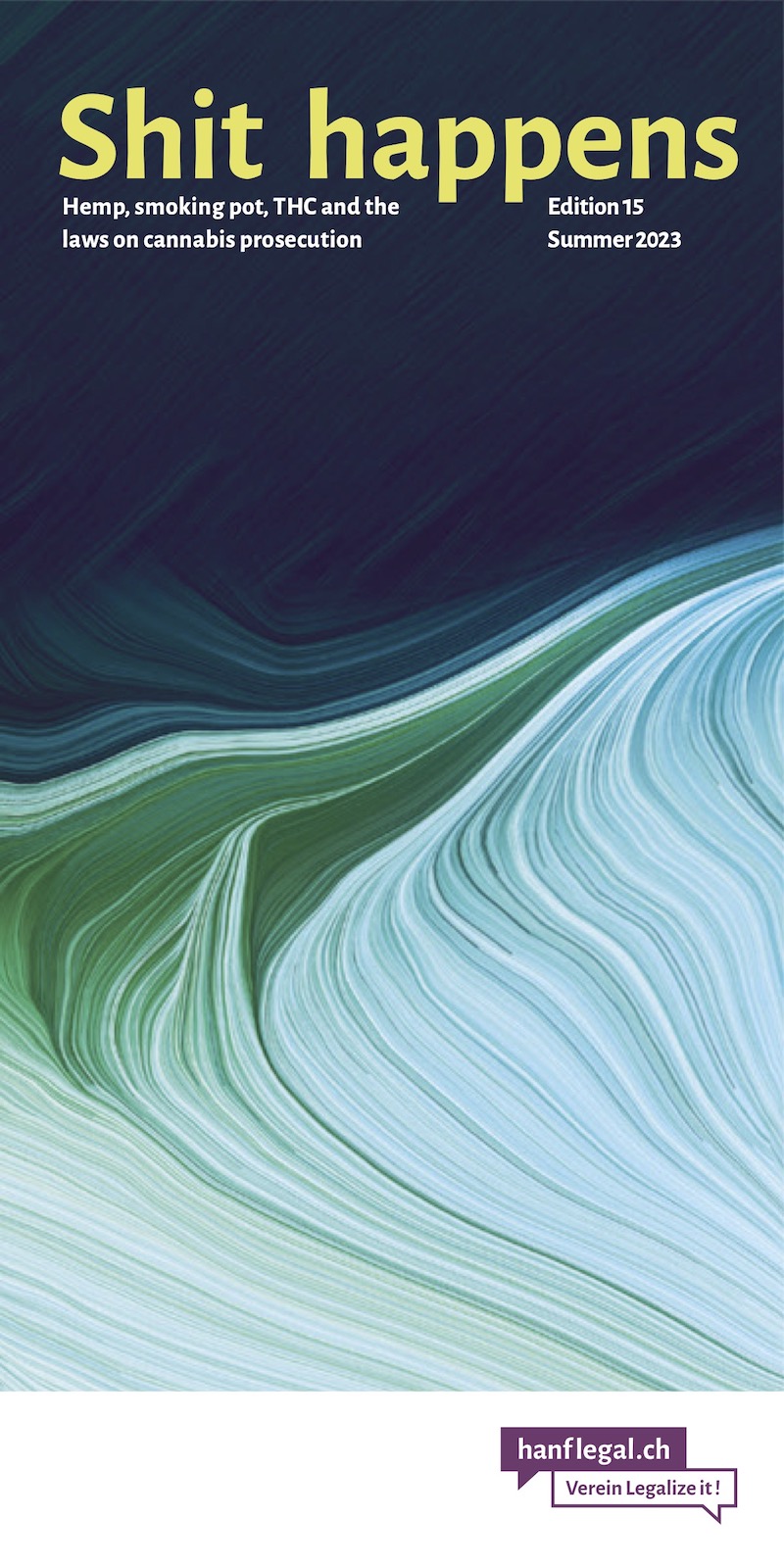- THC & Law:
Table of Contents
The young people as a special case of the prosecution
Laws
Passing on to young people as misdemeanor
Narcotics Act NarcA, SR 812.121, Article 19bis (misdemeanor) as well as
Article 19, Paragraph 2, Point d (serious case), both in PDF (2023) on page 19 and 18
No fixed penalty for juveniles
Fixed Penalties Act (OBG), SR 314.1, Article 4, Item 2 (exception to all other OB), in PDF (2023) on page 3.
Conditions
In principle, everything that is illegal for adults is also illegal for juveniles. However, the prosecution is different: the youth prosecutor's office conducts the proceedings, and the range of punishment is even more open than for adults.
There is no fixed penalty procedure for juveniles, only reprimands.
Tips
The best, but unfortunately unrealistic tip is probably: Don't start smoking pot until you're 18. The range of punishment is wide and the probability of getting puffed at an early age (less because of smoking pot, more because of prosecution) is very high (parents, school, company, youth prosecutor's office).
Penalties
There are “stoner courses” where young people who are caught have to deal with their consumption. There may be warnings or social work, fines are also possible, and in serious cases parental custody may be curtailed or a home stay ordered.
The young people as a special case of the prosecution
Targeting the young
6,213 adolescents were reported in 2020. If THC users are not yet 18 years old, the procedure is different than for adults. Basically, the prohibition is valid, as we describe it on the other pages, but the range of punishment is even more open than with adults. This means that the youth prosecutor's office has a very large discretion as to how to intervene when it learns that young people are smoking pot. They can summon them or give them a written warning (possibly also impose fees ).
The police report young people they catch smoking pot. The youth prosecutor's office then makes the decision. This can be a warning (with e.g. 100 francs fees ), it can also be a fine (e.g. 50 francs and 50 francs fees ). For this purpose, addiction courses are always imposed on the young people, which can last hours to half days. Those who are otherwise conspicuous or have been reported several times are of course dealt with more severely. The possibilities then range from a higher fine to work assignments to conditional or unconditional incarceration.
Courses for smokers
In some areas, if young people who smoke pot are noticed, the youth prosecutor's office does not immediately impose a penalty, but the young people must attend prevention courses and deal with the issue of addiction (“measures”). In case of repeated conspicuousness, a penalty is then imposed.
How do the parents react?
The parents also have some say in the case of under-18s. They are usually informed by the juvenile lawyer (and the decision of the juvenile lawyer naturally reaches the parents). Then, at the latest, an intensive discussion with the parents takes place in addition to the interference of the authorities.
They react very differently. While some fathers and mothers smoke pot themselves and have experience, for inexperienced parents a world collapses - they see their offspring already lying under some bridge with a needle in their arms. These discussions with the parents are more difficult for many young people than the punishment by the juvenile prosecutor's office, because they live together with their parents every day. The legal problems should also be discussed.
No fixed penalties for teenagers
Juveniles cannot be punished with a fixed penalty for smoking a joint in front of the police. The 100 francs is for adults only. The police must report under-18s through the “normal” channels, with the youth prosecutor's office leading the proceedings.
Joint consumption
One specific point to note: When youth under 18 smoke pot with those over 18, passing the joint to those who pass it to those over 18 is not punishable. However, for those who pass the joint to under 18s, it is a misdemeanor, i.e. a highly illegal behavior. This provision was probably intended to combat the temptation of young people to use THC, but it can affect adults who consume THC products together with young people - and especially young people who smoke joints with other young people. Here, too, there is a transfer to under 18-year-olds!
Frequent hand change
In general, the passing on of cannabis containing THC is also always an issue among adults misdemeanor. However, while older adults tend to individualize their consumption and purchase or deal with it in small circles and above all privately, adolescents and young adults have more contacts, spend more time in public, exchange more there - and also exchange cannabis to help each other out or advance money for cannabis procurement. These are all misdemeanor, which can also be well observed and then also punished.
Different consequences
Those who get good grades in school or perform well in their apprenticeship normally hardly have to fear severe sanctions for consumer behavior. On the other hand, those who do poorly in their training or even engage in other illegal activities (spraying, theft) will naturally be dealt with more severely. The sooner someone is caught, the greater the likelihood that he or she will receive increasingly severe penalties - because repeat offenses can be punished more severely with each offense. So it really makes a lot of sense to postpone the first reprimands in life as much as possible: After all, anyone who has already received several fines before reaching the age of majority is in for a difficult start to adult life.
Youth protection
Unfortunately, young people were excluded from the pilot projects. In this area in particular, it would be urgent and important to develop a new approach.
Everyone wants to protect young people, but can society protect young people with punishments? Obviously not.
The only thing left to do is to decriminalize consumption and ban the sale of drugs to young people.
Examples of punishments against juveniles
More articles on the topic of youth
Master thesis (clinical psychology)
What factors influence adolescent drug use and what role do stress and coping play?
(Brigitte Pfanner-Meyer, Barbara Schmocker - ZHAW, May 2016, 108 pages, 3.4 MB)
Support our work with a donation:
Bank transfer
Account number (IBAN):
CH02 0900 0000 8709 1354 3
Full account details
Or scan this QR code with your eBanking App (ZKB, Revolut, Postfinance, …):

Or open/share the QR code as PDF file with your eBanking App.
Credit card
Donate via credit card
Verein Legalize it!
Quellenstrasse 25
8005 Zürich
Threema ID 7NH65RBY
Don’t miss anything! Follow us on social media:
